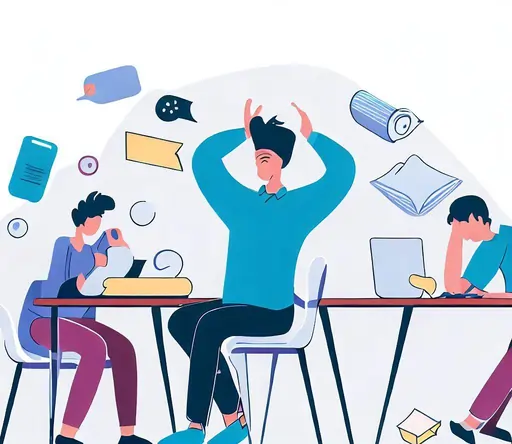Coping with Exam Anxiety: Techniques for Stress Reduction

Understanding Exam Anxiety
Before delving into coping techniques, it's important to understand what exam anxiety is and how it manifests. Exam anxiety is essentially a form of performance anxiety, characterized by feelings of unease, worry, and fear leading up to or during an examination. Some common symptoms include:

Physical Symptoms:
When it comes to exam anxiety, the body often reacts with a range of physical responses. These reactions are the result of the body's "fight or flight" response, which is triggered by stress. Some of the most common physical symptoms of exam anxiety include:
- Racing Heart: A rapid heart rate is a typical stress response. It's as if your body is preparing to face a threat, even though the exam itself isn't a physical danger.
- Sweaty Palms: Sweating is another physiological stress response. The hands might become clammy and sweaty due to the increased activation of the sweat glands.
- Tense Muscles: Stress causes muscles to tense up as a way to prepare for action. This tension can lead to discomfort, pain, and even headaches.
- Nausea: Many people experience a feeling of queasiness or even stomach upset before and during exams due to the body's stress response affecting digestion.
- Headaches: Stress can trigger tension headaches or migraines in some individuals. These headaches can be debilitating and further contribute to the overall discomfort associated with exam anxiety.
- Shortness of Breath: Shallow breathing or difficulty breathing can occur due to heightened anxiety. This can lead to a feeling of breathlessness, which adds to the overall sense of unease.
Cognitive Symptoms:
Exam anxiety doesn't just manifest in physical ways—it can also impact cognitive functioning and thought processes. Some cognitive symptoms of exam anxiety include:
- Negative Thoughts: Exam anxiety often brings about a barrage of negative thoughts and self-doubt. Individuals may doubt their preparation, fear failure, and even catastrophize the potential outcomes.
- Difficulty Concentrating: Anxiety can make it challenging to concentrate and focus on studying or answering exam questions. Your mind might wander, making it harder to retain information.
- Racing Thoughts: Thoughts might race from one worry to another, preventing clear and organized thinking. This can lead to feeling overwhelmed and unable to organize your ideas.
- Memory Issues: Stress can affect memory retrieval, making it difficult to recall information you've studied. This "blanking out" effect can intensify anxiety during exams.
- Perfectionism: Some individuals experience exam-related anxiety due to high self-imposed standards. They might feel compelled to perform perfectly, increasing the pressure they put on themselves.
Behavioural Symptoms:
Exam anxiety doesn't only affect the body and mind—it also influences behaviour. Recognizing these behavioural indicators can help individuals take steps to manage their stress more effectively:
- Procrastination: Anxiety can lead to avoidance behaviour, where you procrastinate studying or delay starting your preparation due to the fear of facing the exam.
- Restlessness: Restlessness is a common behavioural manifestation of anxiety. You might find it hard to sit still or focus on a task due to the inner turmoil caused by stress.
- Avoidance: Some individuals might actively avoid studying or discussing the exam. This avoidance behaviour can worsen anxiety over time, as it reinforces the perception of the exam as a threat.
- Negative Self-Talk: Negative thoughts can translate into negative self-talk, where you constantly criticize your abilities and worry about not measuring up.
- Changes in Routine: Anxiety can disrupt your routine. You might experience changes in appetite, sleep patterns, and overall daily habits.
Recognizing these symptoms is the first step toward managing exam anxiety effectively. By understanding that these reactions are a natural stress response, you can then implement strategies to counteract them. Techniques such as relaxation exercises, positive self-talk, and effective study habits can help mitigate these symptoms and ultimately lead to a more positive exam experience. Remember, seeking support from friends, family, or mental health professionals is always an option if you find yourself struggling to cope with the impact of exam-related stress. Now that we have a clearer picture of what exam anxiety entails, let's explore techniques that can effectively alleviate its impact.
Proven Techniques for Reducing Anxiety and Managing Exam Anxiety
In the fast-paced world of academics, exams can often bring about a torrent of stress and anxiety. The pressure to perform well, coupled with the fear of failure, can make the exam season an overwhelming experience. However, the journey from exam stress to success doesn't have to be fraught with tension. In this article, we will explore time-tested techniques that have proven to effectively manage and reduce exam-related stress, empowering you to face your exams with confidence and composure.
- Effective Time Management:
- Practice Mindfulness and Relaxation:
- Positive Self-Talk:
- Effective Study Techniques:
- Physical Well-Being:
- Seek Support:
- Visualization and Positive Imagery:
- Breaks and Rewards:
- Mock Exams and Simulations:
- Focus on the Process, Not Just the Outcome:
One of the major contributors to exam anxiety is feeling overwhelmed by the sheer amount of material to cover. Proper time management can help you break down your study sessions into manageable chunks. Create a study schedule that allocates time for each subject or topic, ensuring that you have enough time to review all the material. This way, you'll prevent last-minute cramming and reduce the pressure that comes with it.
Mindfulness techniques, such as deep breathing exercises, meditation, and progressive muscle relaxation, can significantly reduce anxiety. Deep breathing helps calm the nervous system, while meditation encourages focusing on the present moment rather than worrying about the future. Progressive muscle relaxation involves tensing and releasing different muscle groups, promoting a sense of physical and mental relaxation.
Challenge negative thoughts with positive affirmations. Instead of dwelling on thoughts like "I'll never pass this exam," replace them with statements like "I've prepared well, and I am capable of doing my best." Positive self-talk can boost your confidence and change your perspective on the upcoming exam.
Employing efficient study techniques can help you retain information better, thus boosting your confidence. Techniques such as active recall (quizzing yourself on the material), spaced repetition (reviewing material at increasing intervals), and teaching the material to someone else can enhance your understanding and reduce anxiety related to forgetting what you've learned.
A healthy body contributes to a healthy mind. Prioritize proper nutrition, regular exercise, and sufficient sleep during your exam preparation period. A well-balanced diet and physical activity can help regulate stress hormones and improve your overall mood. Additionally, getting enough sleep ensures your brain is well-rested and ready for optimal performance.
Don't hesitate to reach out for support from friends, family, or even professionals if you're feeling overwhelmed. Sometimes, discussing your anxieties with someone you trust can provide relief and perspective. If your anxiety is severely impacting your daily life, considering speaking to a mental health professional is a step toward managing your stress effectively.
Visualization involves imagining yourself completing the exam. This technique can help build confidence and reduce anxiety by making the situation seem more familiar and achievable. Combine visualization with positive imagery, where you visualize a calm and composed version of yourself during the exam.
Allow yourself regular breaks during study sessions to prevent burnout. Reward yourself after completing specific study goals. These breaks and rewards can serve as motivation and make the study process feel less daunting.
Taking practice tests and mock exams under timed conditions can help simulate the actual exam environment. This exposure can desensitize you to the anxiety associated with exam conditions and improve your time management skills.
Shift your focus from solely aiming for a high score to appreciating the learning process. Embrace the growth and knowledge you're gaining through your studies, regardless of the final result.
Conclusion
In the race to conquer exam anxiety, it's crucial to remember that stress reduction is not only about achieving high scores but also about nurturing a positive relationship with learning. By implementing these proven techniques, you are equipping yourself with a toolbox of strategies that extend far beyond the exam room—techniques that foster resilience, self-care, and mental well-being. As you navigate the path from stress to success, keep in mind that you have the power to transform exam periods from daunting challenges into opportunities for growth and accomplishment. Embrace these techniques, believe in yourself, and stride confidently towards a future where exam anxiety no longer holds you back, but propels you forward.